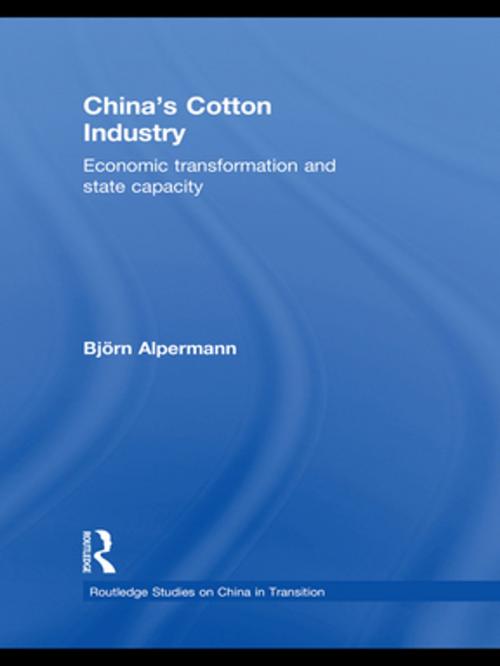China's Cotton Industry
Economic Transformation and State Capacity
Business & Finance, Economics, International, Nonfiction, Social & Cultural Studies, Social Science, Cultural Studies, Ethnic Studies| Author: | Björn Alpermann | ISBN: | 9781135149079 |
| Publisher: | Taylor and Francis | Publication: | April 5, 2010 |
| Imprint: | Routledge | Language: | English |
| Author: | Björn Alpermann |
| ISBN: | 9781135149079 |
| Publisher: | Taylor and Francis |
| Publication: | April 5, 2010 |
| Imprint: | Routledge |
| Language: | English |
The cotton processing industry is a distinct sector of China’s rural economy which recently underwent a momentous transition from plan to market. China is the world’s largest producer as well as consumer of cotton, and cotton processing links the agricultural production of this important commodity to China’s booming textile industry.
Alpermann examines the political economy of the cotton processing industry, analyzes the process of cotton policy making and discusses reform outcomes on a national scale and the central state’s response. He then goes on to examine the implementation of economic transformation and institutional change in two traditional cotton-growing regions, looking at how local governments and the former monopolist cope with the changes brought about by marketization.
Studying the cotton industry provides a lens through which to observe the changes in the way the state governs the economy during China’s transition and helps to assess the diverging claims about the nature of the political economy in China. As such China's Cotton Industry is an essential read for anyone studying Chinese business, econmics or politics.
The cotton processing industry is a distinct sector of China’s rural economy which recently underwent a momentous transition from plan to market. China is the world’s largest producer as well as consumer of cotton, and cotton processing links the agricultural production of this important commodity to China’s booming textile industry.
Alpermann examines the political economy of the cotton processing industry, analyzes the process of cotton policy making and discusses reform outcomes on a national scale and the central state’s response. He then goes on to examine the implementation of economic transformation and institutional change in two traditional cotton-growing regions, looking at how local governments and the former monopolist cope with the changes brought about by marketization.
Studying the cotton industry provides a lens through which to observe the changes in the way the state governs the economy during China’s transition and helps to assess the diverging claims about the nature of the political economy in China. As such China's Cotton Industry is an essential read for anyone studying Chinese business, econmics or politics.















